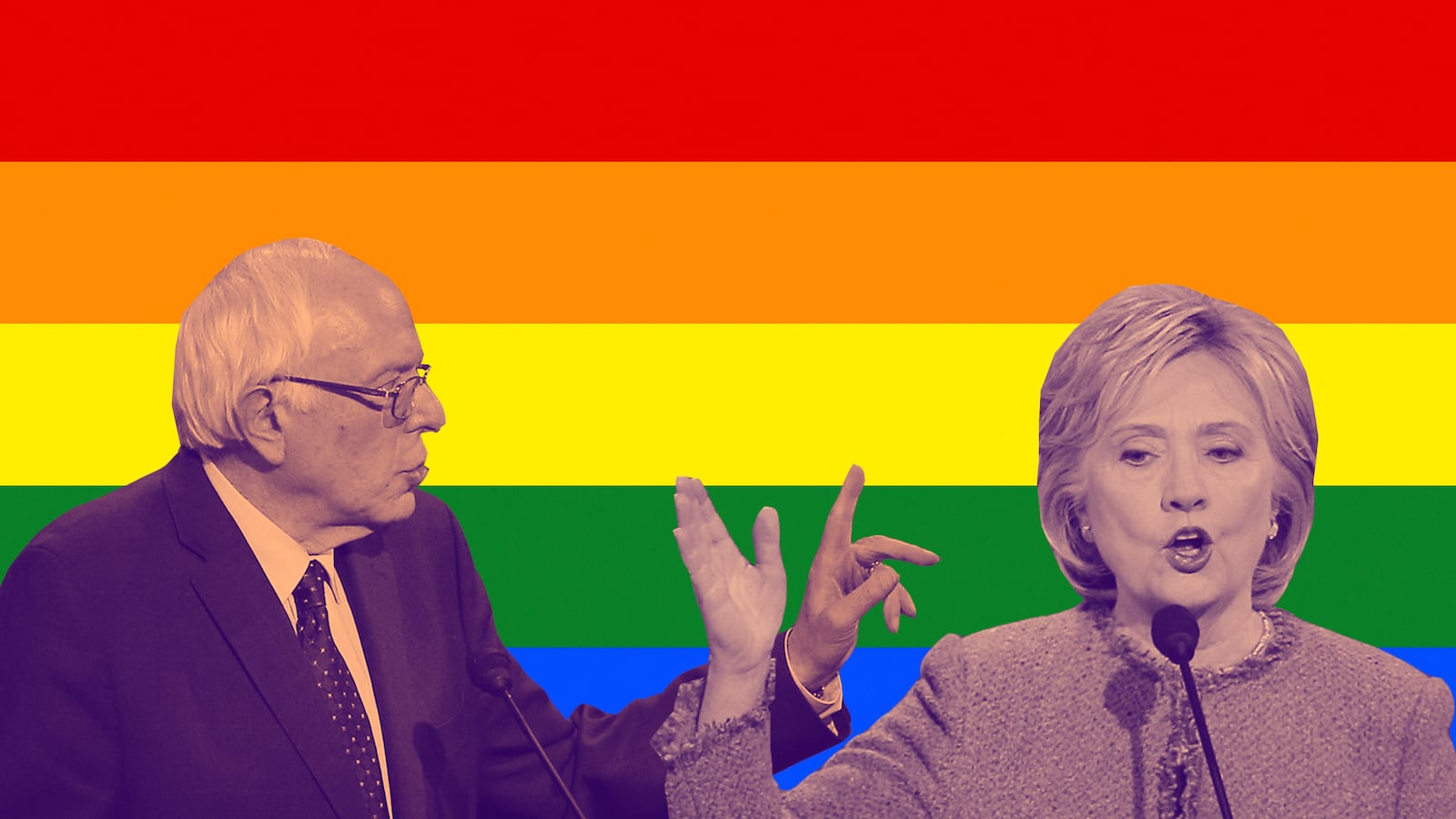Earlier this week, the Human Rights Campaign made a particularly on-brand presidential endorsement, throwing their support behind another HRC: the candidate formerly known as Hillary Rodham Clinton.
“All the progress we have made as a nation on LGBT equality—and all the progress we have yet to make—is at stake in November,” HRC President Chad Griffin said in a statement. “While they fight to take us backwards, Hillary Clinton is fighting to advance LGBT equality across our nation and throughout the world. We are proud to endorse Hillary Clinton for president, and believe that she is the champion we can count on in November—and every day she occupies the Oval Office.”
According to national poll number averages from Real Clear Politics, the endorsement was a safe bet. Although she appears to be losing momentum, Clinton is still beating her Democratic opponents—leading her closest rival, Sen. Bernie Sanders, by 13 points. She remains the frontrunner, buoyed by her status as the mainstream alternative to Sanders’s far-left views.
And in a statement, Sanders argued that the Human Rights Campaign endorsement, while a frustrating choice given his record on LGBT rights, is an indicator of her status as the “establishment” pick. “What we are doing in this campaign, it just blows my mind every day because I see it clearly, we’re taking on not only Wall Street and economic establishment, we’re taking on the political establishment,” Sanders said. “Some of these groups are, in fact, a part of the establishment.”
The statement may have proven controversial on the Internet, but Bernie Sanders is both absolutely right and completely missing the point. The Human Rights Campaign has long been criticized by queer activists as the embodiment of “Big Gay” politics, marginalizing the interests of trans folks and people of color in favor of issues that favor rich, white gay men. But in distancing himself from the politics of Mrs. Clinton and the “establishment” that supports her, he fails to recognize that his own history on the issues is hardly radical.
While the Human Rights Campaign pushed the issues of marriage equality and gays serving openly in the military throughout the 1990s and 2000s, the organization persistently fought the inclusion of trans people in equal-rights legislation. The HRC famously opposed gender identity protections in the Employment Non-Discrimination Act. First introduced to Congress by Sen. Gerry Studds (D-MA) back in 1994, the bill sought to prohibit identity-based workplace discrimination—meaning that employers would no longer be able to fire someone (or prevent them from being hired) on the basis of their LGBT status.
But the Human Rights Campaign’s then-executive director, Elizabeth Birch, opposed offering those protections to transgender workers, stating it would happen “over her dead body.” As TransGriot’s Monica Roberts explains, Birch’s opposition was based on an old tactic of gay-rights leaders: By throwing trans people under the bus, they hoped to make bills like ENDA more palatable to the mainstream—in cutting out such “extreme language.” The Gay Liberation Front’s Jim Fouratt used the same exact argument to oppose trans inclusion in a 1971 anti-discrimination measure.
While Chad Griffin, the current president of the Human Rights Campaign, has publicly apologized to the community for the organization’s historically bad record on trans rights, the HRC has still struggled to overcome its own legacy of discrimination. During a 2012 rally in support of same-sex marriage, the group asked attendees not to display a flag representing the trans community. According to Mic’s Maribel Hermosillo, HRC workers told them that “marriage equality isn’t a trans issue.”
In addition to sidelining trans voices in favor of appealing to the mainstream, the Human Rights Campaign’s Workplace Equality Index has long supported companies that work against queer interests. 2015 marked the 12th year in a row that the HRC awarded Goldman Sachs—the Wall Street firm whose subprime mortgage practices were instrumental in crashing the American economy in 2008—with a perfect rating. As queer people (especially trans folks) are disproportionately likely to live under the poverty line, these marginalized groups are uniquely affected by economic crises.
Aside from similar acronyms, Hillary Clinton has much in common with the HRC. Known as “Mrs. Wall Street,” she’s viewed by insiders as the candidate most favorable to corporate interests. This stands in stark contrast to Sanders, who has dedicated his career to taking on the excesses of unregulated capitalism. “Let us wage a moral and political war against the billionaires and corporate leaders, on Wall Street and elsewhere, whose policies and greed are destroying the middle class of America,” Sanders urged in a 2012 essay for the Huffington Post.
If those leanings put Clinton at odds with the economic interests of many LGBT people, her queer advocacy has also been the product of establishment thinking. During the 1990s, Hillary Clinton supported both Don’t Ask, Don’t Tell and the Defense of Marriage Act, a pair of bills that, respectively, barred gays from military service and restricted the legal definition of “marriage” to the union between a man and a woman. Both policies—which were wildly popular at the time—were instituted during her husband’s tenure as president.
During her successful New York Senate run in 2000, Clinton continued to back DOMA—although she would distance herself from the bill during her 2008 campaign for the White House. This was a time when most Americans still opposed full legal recognition for same-sex couples, but as public opinion shifted, so did Hillary Clinton’s opinions on the subject. May 2012 marked the first time in history a majority of U.S. citizens (at 50 percent) supported marriage equality, and just 10 months later, Clinton would announce she, too, had “evolved” on the issue. She finally came out in support of marriage equality in 2013.
In contrast with Clinton’s “wait and see” approach, Sanders has touted himself as ahead of the curve on queer equality. Last May, Sanders explained to The New York Times that he didn’t have to “come around” to the issue. “I’m not evolving when it comes to gay rights,” he said. “I was there!” Leaning on his track record is a familiar argument for the Vermont senator, who also touts his history on civil rights as proof that he stands with the goals of the #BlackLivesMatter campaign.
But whether he likes it or not, he’s been just as much a participant in “establishment” politics as the groups that he’s criticizing. Sanders voiced support for gay rights in an early-1970s open letter and opposed DOMA, and while he was ahead of his time on both counts, neither of these stances showed an explicit concern for LGBT people. Instead, his appeals were based on government overreach and constitutional grounds.
“[T]here are entirely too many laws that regulate human behavior,” he wrote in the letter. “Let us abolish all laws which attempt to impose a particular brand of morality or ‘right’ on people.”
In response to Sanders’s “No” vote against the Defense of Marriage Act, his wife, Jane Sanders, specified that it was not an identity-based decision. Instead, her husband felt that it constituted a violation of the legal jurisdiction granted to individual states to decide marriage laws. “We’re not legislating values,” Mrs. Sanders argued. “We have to follow the Constitution.”
According to the Huffington Post, “[Bernie Sanders’] spokesman Michael Briggs made the case… that Sanders has been way ahead of Clinton—and pretty much everyone—in advocating same-sex marriage.” But that’s simply not true.
In an essay for Slate, Mark Joseph Stern writes, “As mayor of Burlington in 1990, Sanders told an interviewer that LGBT rights were not a ‘major priority’ for him.” He opposed marriage equality throughout the 2000s, calling it a “divisive” issue and maintaining his support for civil unions, before eventually coming around in 2009.
And although Vermont would become the first state to pass civil unions in 2000, his support for that groundbreaking measure wasn’t about making history for same-sex couples but based in the exact same mindset: protecting states’ rights. Sanders finally “evolved” on marriage four years before Hillary Clinton—the length of an entire presidential term—but it’s hardly the light-years-ahead-of-its-time stance his campaign is touting.
Whether or not he likes to admit it, that means the progressive senator has more in common with Clinton and the Human Rights Campaign than he’d like to believe. And when LGBT voters go to help choose the Democratic nominee, they’ll ultimately be faced with a choice between two imperfect champions for equality.





